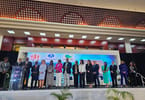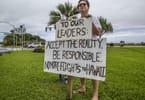ٹائمنگ اور عمل درآمد
5. SEC کی مجوزہ نفاذ کی ٹائم لائن بہت جارحانہ ہے اور AHLA کے اراکین کو اصول کے افشاء کے تقاضوں کی مناسب تعمیل کرنے کے لیے کافی وقت نہیں دیتی ہے۔ رولز کے نفاذ کو دو سال کے لیے موخر کیا جائے۔
اپنی بحث میں، SEC میں ایک نمونہ تعمیل کا شیڈول شامل ہے جو دسمبر 2022 کی مؤثر تاریخ کو فرض کرتا ہے۔
اس ٹائم لائن کے مطابق، بڑے تیزرفتار فائلرز 1 کے مالی سال کے لیے تمام آب و ہوا سے متعلق خطرات اور دائرہ کار 2 اور 2024 کے اخراج کے بارے میں رپورٹ کریں گے۔
اس کے لیے ان رجسٹروں کو جنوری 2023 کے اوائل سے ڈیٹا اکٹھا کرنا اور تجزیہ کرنا شروع کرنا ہوگا، اس بات پر منحصر ہے کہ ان کا مالی سال کب شروع ہوتا ہے، جس کے لیے مؤثر طریقے سے رجسٹر کرنے والوں کو حتمی اصول کی اشاعت سے پہلے ابھی تیاری شروع کرنے کی ضرورت ہوتی ہے۔
رجسٹر کرنے والوں کو اپنے مالیاتی بیان کے فوٹ نوٹ کے انکشافات کے لیے 2023 سے بھی پہلے برسوں تک معلومات جمع کرنے کی ضرورت ہوگی۔
عمل درآمد کی یہ ٹائم لائن بہت جارحانہ ہے اور اس اقدام کے پیمانے کا مناسب حساب دینے میں ناکام ہے۔
ٹائم لائن رجسٹر کرنے والوں کو اصول کا کافی تجزیہ کرنے اور مکمل اور درست رپورٹنگ کے لیے درکار جمع اور تصدیقی عمل کو لاگو کرنے کا موقع نہیں دیتی۔
انکشاف کے تمام تقاضوں کو پورا کرنے کے لیے، ہمارے اراکین کو اصول کو مکمل طور پر جذب کرنے اور ان کی تعمیل کے لیے درکار داخلی پالیسیوں اور عمل کو قائم کرنے کے لیے مزید وقت درکار ہے۔
ان میں سے کچھ اقدامات میں داخلی ٹیموں کو جمع کرنا اور ڈیٹا اکٹھا کرنے کے پروگراموں کے انتظام کے لیے ضروری اہلکاروں کو تربیت دینا، اخراج کا حساب لگانے کے لیے پلیٹ فارمز اور طریقہ کار تیار کرنا اور متعلقہ خطرات اور مواقع کا اندازہ لگانا، تعمیل معاونت کے لیے باہر کے مشورے اور آڈیٹنگ فرموں کو شامل کرنا، اور فریق ثالث کے مالکان کے ساتھ ہم آہنگی کرنا شامل ہیں۔ آپریٹرز جو ڈیٹا کو کنٹرول کرتے ہیں لیکن دوسری صورت میں SEC کے افشاء کی ضروریات کے تابع نہیں ہیں۔
اگرچہ ہمارے بہت سے ممبران نے پہلے ہی ان میں سے کچھ عمل کو اپنی رضاکارانہ آب و ہوا کی رپورٹنگ کے حصے کے طور پر لاگو کر دیا ہے، ذمہ داری کی اضافی پرت جو SEC فائلنگ سے منسلک ہوتی ہے، تسلی بخش تعمیل کو یقینی بنانے کے لیے اضافی تطہیر اور اندرونی کنٹرول اور عمل کی مزید ترقی کی ضرورت ہوتی ہے۔
ہمارے بہت سے ممبران اپنی وسیع آب و ہوا کی حکمت عملی تیار کرنے کے ابتدائی مراحل میں ہیں اور ابھی تک تحریری اصول کی تعمیل کے لیے بہت سے ضروری طریقہ کار کو قائم کرنا ہے۔ مزید برآں، ہمارے بہت سے اراکین کا خیال ہے کہ SEC کے ابتدائی تعمیل لاگت کے تخمینے ان اقدامات کی مناسب عکاسی نہیں کرتے، اور نہ ہی اضافی اخراجات جو کہ تعمیل کے دوران لامحالہ پیدا ہوں گے۔
2022 کیلنڈر سال کے لیے مالیاتی بجٹ پہلے ہی قائم کیے جا چکے ہیں، جو 2022 میں خاطر خواہ لاگت کو جذب کرنے کے لیے چیلنجز پیش کرتے ہیں جو طریقہ کار کو نافذ کرنے کے لیے درکار ہیں اور 2023 کے آغاز میں رپورٹنگ کی آخری تاریخ تک ڈیٹا اکٹھا کرنا شروع کرنے کے لیے عملے کو تعینات کرنا ہے۔
لہذا، ہم SEC سے کم از کم دو سال تک عمل درآمد میں تاخیر کرنے کی درخواست کرتے ہیں اور دسمبر 2022 کی مؤثر تاریخ کو فرض کرتے ہوئے، پہلی رپورٹنگ 2026 سے پہلے کی ہونی چاہیے۔
6. رجسٹرار کے فارم 10-K میں انکشافات کو شامل کرنے کا تقاضہ کرنا رجسٹر کرنے والوں کو اپنے GHG کے اخراج کو اس طرح جمع کرنے اور اس کی تصدیق کرنے کی اجازت نہیں دیتا ہے جو SEC فائلنگ کے لیے کافی ہو اور موجودہ موسمیاتی رپورٹنگ ٹائم لائنز کے ساتھ ہم آہنگ نہیں ہوتا ہے۔ تمام آب و ہوا کے انکشافات کو ایک علیحدہ رپورٹ میں شامل کیا جانا چاہئے۔
ضابطے کے لیے جارحانہ نفاذ کی ٹائم لائن کے علاوہ، رجسٹر کرنے والوں کو اپنے فارم 10-K یا رجسٹریشن اسٹیٹمنٹ کے حصے کے طور پر سالانہ ان انکشافات کی اطلاع دینی ہوگی۔
لہذا AHLA کے زیادہ تر عوامی اراکین کے پاس اپنے پچھلے مالی سال سے مطلوبہ موسمیاتی خطرے اور اخراج کے ڈیٹا کو جمع کرنے، تصدیق کرنے اور مطلوبہ یقین دہانی حاصل کرنے کے لیے صرف 60 دن ہوں گے۔
یہ ٹائم لائن انتہائی مشکل ہے اگر کمپنیوں کے لیے مطمئن کرنا ناممکن نہیں ہے۔
اگرچہ یہ اصول رجسٹراروں کو چوتھی سہ ماہی کے اعداد و شمار کا تخمینہ لگانے کی اجازت دے کر اس چیلنج سے نمٹنے کی کوشش کرتا ہے کہ اگر کوئی معقول طور پر دستیاب نہ ہو، تو یہ نقطہ نظر ان کی فرنچائزز اور فریق ثالث مینجمنٹ کمپنیوں سے ڈیٹا حاصل کرنے میں خاص طور پر جی ایچ جی کے اخراج میں نمایاں تاخیر کا سبب نہیں بنتا۔ ، جو اسے ابتدائی طور پر یوٹیلیٹی کمپنیوں اور دوسرے فریق ثالث فروشوں سے جمع کرے۔
ہوٹل کی صنعت میں یہ وقفہ خاص طور پر شدید ہے کیونکہ فریق ثالث کا کردار اخراج کے اعداد و شمار کا جائزہ لینے اور اس کی تصدیق کے پہلے سے وسیع عمل میں ایک اضافی پرت کا اضافہ کرتا ہے جس طرح SEC فائلنگ کے لیے کافی ہے۔
موجودہ مالیاتی انکشاف کے تقاضوں کے تحت سالانہ رپورٹنگ کی حد اور دائرہ کار پہلے ہی چیلنجنگ ہے اور ہمارے بہت سے ممبران جو مالیاتی معلومات تیار کرنے اور جمع کروانے کے لیے فریق ثالث پر انحصار کرتے ہیں، پہلے سے ہی اپنا فارم تیار کرنے کے لیے 60 دن کی مدت کے اندر دستیاب وقت کا زیادہ تر استعمال کرتے ہیں۔ 10-K SEC کے اپنے تخمینے کے مطابق، یہ اصول ممکنہ طور پر پہلے سے سخت شیڈول میں 3,000 گھنٹے سے زیادہ اضافی رپورٹنگ بوجھ ڈالتا ہے۔
یہ عمل وقتی ہے کیونکہ یہ فی الحال موجود ہے، اور یہ اصول غیر ضروری طور پر وقت کے تقاضوں اور فارم 10-K پر عوامی رپورٹنگ کے اخراجات میں اضافہ کرے گا جب ڈیٹا اکٹھا کرنے کے وہی اہداف بعد میں فائلنگ میں حاصل کیے جاسکتے ہیں۔
Further, our members who are currently producing ESG and other climate-related reports generally rely on a mid-year timeframe for producing this data.
The SEC’s reporting schedule would upend this process entirely. Leading global reporting frameworks, such as the CDP relied on by many of our members for their voluntary climate disclosures, generally require reports to be submitted mid-year to provide adequate time for collection and vetting of prior year data.
It has therefore become an industry practice for companies to submit these disclosures and publish their organizations’ sustainability reports in late Q2 or early Q3 for data collected for the company’s previous fiscal year.
This affords companies adequate time to coordinate with third-party contractors and vendors, collect the relevant GHG emissions data and verify the figures to a level they are comfortable publishing in their annual sustainability reports.
By requiring these climate disclosures to be included in the Form 10-K and imposing onerous attestation thresholds, the Rule establishes a compressed reporting timeline that offers registrants no flexibility to file their SEC disclosures in a sufficiently detailed and precise manner that aligns with the climate disclosure processes they have already instituted.
Providing companies with the time required to produce reliable data is the best way to fulfill the Rule’s intent of collecting reliable, consistent, and comparable data for investors.
We, therefore, suggest that the SEC separate these new disclosures from the Form 10-K entirely and instead allow registrants to file a separate climate-specific report 180 days after fiscal year-end. Lastly, whatever disclosures are required should be prospective only, with historic data only being provided based on the first year when reporting under the rule is required.
7. رجسٹر کرنے والے کی کارروائیوں سے شروع ہونے والے افشاء کے اضافی تقاضوں کا نفاذ کمپنیوں کو جارحانہ آب و ہوا کے اہداف کو حاصل کرنے سے حوصلہ شکنی کرے گا، خاص طور پر دائرہ کار 3 کے اخراج کے حوالے سے۔
Many of the Rule’s disclosure requirements are triggered by a company’s actions. For example, a registrant that has adopted a climate transition plan must disclose a detailed description of that plan as part of its SEC filing.
Similarly, to the extent a company uses scenario analysis to assess the resilience of its business strategy, those analytical tools must be disclosed even though the Rule does not impose any obligation on registrants to conduct such an analysis. In fact, merely setting a climate-related target or goal internally could trigger the need for a company to provide detailed disclosures, which may include confidential business information.
Of most concern, a registrant whose climate-related targets include a Scope 3 component would then be required to report those emissions.
The SEC has acknowledged that companies may set longer-term goals without full knowledge of the path they will take to achieve their target. It is therefore imperative that such goals not be construed as promises or guarantees, nor should they bind companies to additional reporting requirements under the Rule.
Establishing higher reporting thresholds for registrants who have embraced effective new tools and set more aggressive emissions targets likely will discourage those companies from continuing to be forward-leaning on climate issues, particularly in regard to Scope 3 emissions commitments.
Many of our members who have made or are considering making bold climate commitments, such as achieving net-zero emissions, will likely reconsider whether those goals are ultimately in their companies’ best interest given the added burdens of disclosing these activities as part of their official SEC filings.
The SEC has provided reasoning for why these particular disclosures are not required as of right, including the complexity of the information and the “undue burden” such requirements would impose on certain registrants.
We appreciate that the SEC has considered the challenges that many of these requirements present. We do not believe, however, that treating certain companies differently and, in effect, penalizing them for overcoming these challenges and taking voluntary action serves the broader goal of increased transparency and better data for investors.
Nor does this approach serve the ultimate goal of reducing the emissions and overall environmental impact of public companies. We, therefore, urge the SEC to remove disclosure requirements that are specifically tied to a company’s former or current actions and instead allow registrants to furnish this information on a voluntary basis, as a growing number of our members are currently doing.
Rather than incentivizing companies to limit their climate-related commitments, we believe this approach will provide registrants with the security and predictability they need to continue setting ambitious climate goals and refining best practices for assessing and mitigating climate-related risks and opportunities.
اختتام
As noted above, AHLA is committed to collaborating with the SEC to produce a climate disclosure framework that serves investor interests by producing consistent, comparable, and reliable data. In order to achieve the SEC’s goal, the Rule must include practical requirements that are predictable and viable for AHLA members and the broader hospitality industry.
We encourage the SEC to consider the concerns and suggestions we have raised and we look forward to further discussing the Rule.
مخلص،
Chip Rogers President and CEO
امریکن ہوٹل اینڈ لاجنگ ایسوسی ایشن
اس مضمون سے کیا حاصل کیا جائے:
- 2022 کیلنڈر سال کے لیے مالیاتی بجٹ پہلے ہی قائم کیے جا چکے ہیں، جو 2022 میں خاطر خواہ لاگت کو جذب کرنے کے لیے چیلنجز پیش کرتے ہیں جو طریقہ کار کو نافذ کرنے کے لیے درکار ہیں اور 2023 کے آغاز میں رپورٹنگ کی آخری تاریخ تک ڈیٹا اکٹھا کرنا شروع کرنے کے لیے عملے کو تعینات کرنا ہے۔
- ہوٹل کی صنعت میں یہ وقفہ خاص طور پر شدید ہے کیونکہ فریق ثالث کا کردار اخراج کے اعداد و شمار کا جائزہ لینے اور اس کی تصدیق کے پہلے سے وسیع عمل میں ایک اضافی پرت کا اضافہ کرتا ہے جس طرح SEC فائلنگ کے لیے کافی ہے۔
- Some of these steps include assembling internal teams and training necessary personnel to administer data collection programs, developing platforms and methodologies for calculating emissions and assessing relevant risks and opportunities, engaging outside counsel and auditing firms for compliance support, and coordinating with third-party owners and operators who control the data but are not otherwise subject to the SEC's disclosure requirements.






















